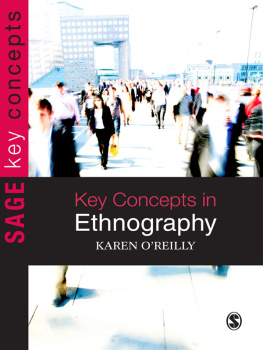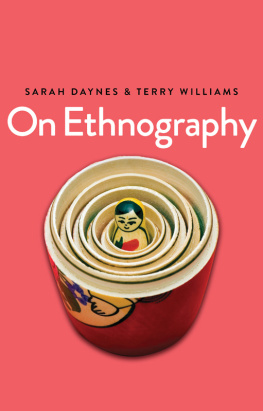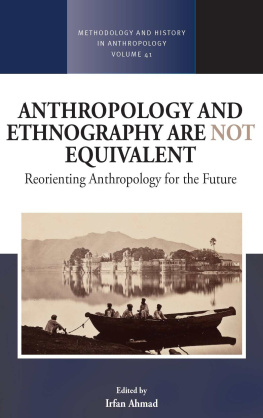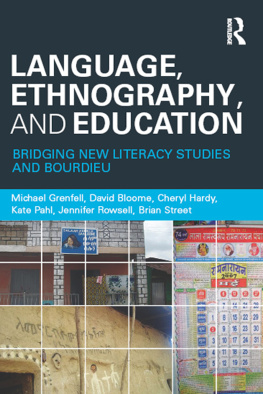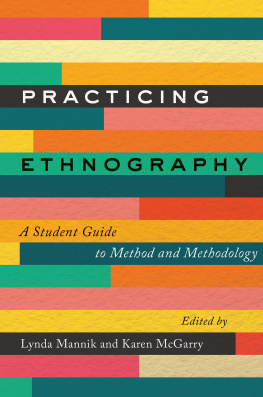Key Concepts in
Ethnography
Recent volumes include:
Key Concepts in Social Research
Geoff Payne and Judy Payne
Fifty Key Concepts in Gender Studies
Jane Pilcher and ImeldaWhelehan
Key Concepts in Medical Sociology
Jonathan Gabe, Mike Bury and Mary Ann Elston
Key Concepts in Leisure Studies
David Harris
Key Concepts in Critical Social Theory
Nick Crossley
Key Concepts in Urban Studies
Mark Gottdiener and Leslie Budd
Key Concepts in Mental Health
David Pilgrim
Key Concepts in Journalism Studies
Bob Franklin, Martin Hamer, Mark Hanna, Marie Kinsey and John Richardson
Key Concepts in Political Communication
Darren G. Lilleker
Key Concepts in Teaching Primary Mathematics
Derek Haylock
Key Concepts in Work
Paul Blyton and Jean Jenkins
Key Concepts in Nursing
Edited by Elizabeth Mason-Whitehead, Annette McIntosh, Ann Bryan, Tom Mason
Key Concepts in Childhood Studies
Allison James and Adrian James
The SAGE Key Concepts series provides students with accessible and authoritative knowledge of the essential topics in a variety of disciplines. Cross-referenced throughout, the format encourages critical evaluation through understanding. Written by experienced and respected academics, the books are indispensable study aids and guides to comprehension.
KAREN OREILLY
Key Concepts in
Ethnography
Karen OReilly 2009
First published 2009
Apart from any fair dealing for the purposes of research or private study, or criticism or review, as permitted under the Copyright, Designs and Patents Act, 1988, this publication may be reproduced, stored or transmitted in any form, or by any means, only with the prior permission in writing of the publishers, or in the case of reprographic reproduction, in accordance with the terms of licences issued by the Copyright Licensing Agency. Enquiries concerning reproduction outside those terms should be sent to the publishers.
SAGE Publications Ltd
1 Olivers Yard
55 City Road
London EC1Y 1SP
SAGE Publications Inc.
2455 Teller Road
Thousand Oaks, California 91320
SAGE Publications India Pvt Ltd
B 1/I 1 Mohan Cooperative Industrial Area
Mathura Road, New Delhi 110 044
SAGE Publications Asia-Pacific Pte Ltd
33 Pekin Street #02-01
Far East Square
Singapore 048763
Library of Congress Control Number: 2008924903
British Library Cataloguing in Publication data
A catalogue record for this book is available from the British Library
ISBN 978-1-4129-2864-9
ISBN 978-1-4129-2865-6 (pbk)
Typeset by C&M Digitals (P) Ltd., Chennai, India
Printed in Great Britain by The Cromwell Press Ltd, Trowbridge, Wiltshire
Printed on paper from sustainable resources
contents
Introduction
Please read this first
WHY DO WE NEED ANOTHER BOOK ON ETHNOGRAPHY?
Social research methods texts have been growing in number incrementally in the past decades. It seems that every methodology, analytical approach, technique, and stage of the research process has its own dedicated book, and ethnography is no exception. There are books on visual ethnography, virtual ethnography, organisational ethnography, ethnography and education, ethnography and health, writing ethnography and so on (apparently ad infinitum). Perhaps this is precisely why a book like this one is called for.
This book clearly and succinctly summarises a broad range of issues relevant to ethnography. It is not quite an encyclopaedia but is more than a dictionary. It is comprehensive yet brief. It is small and neat and easy to hold and flick through. It covers methodological techniques, advances, debates, concepts, and research fields. Time-honoured themes traditionally explored in qualitative methods textbooks are included, such as key informants, access, participant observation, and rapport. Issues sometimes excluded from older texts, such as reflexivity, writing, fieldnotes, and ethics are also covered. But, more exciting, recent developments such as virtual and multi-sited ethnography also have their place. No other book covers all these themes of direct relevance to ethnography in one place.
Each concept is presented comprehensively yet critically, with examples from ethnographic fieldwork accounts, and with references for students to follow up if they want to pursue a topic in more depth. Cross-references to concepts covered in the book are indicated by the use of bold. The examples are enjoyable to read and are collated from a range of books and articles. However, I have tried to use several examples from a few of the same projects, so that as the student dips into the concepts over time, he or she will gradually become familiar with the work of a few authors in some depth.
The book draws on my own reflexive-realist perspective. I am a sociologist with intellectual ties to both social anthropology and human geography. I have a background in qualitative and quantitative methods and have taught ethnographic methods for a number of years to undergraduates and postgraduates from a range of social science disciplines. This unique perspective impacts on my interpretation of the concepts addressed. I enjoy postmodern accounts for their creativity and passion but I am concerned that ethnographers should also remain faithful to what they set out to do when access was first obtained. It is crucial that we conduct ethnography reflexively with constant awareness of our role in the research enterprise. However, this does not mean abandoning any sense that there is a real world we wish to learn about, and which our research participants live in, experience, feel constrained by, and help create.
The book can be dipped into as required, to learn about individual concepts, or consulted in its entirety, as a treatise on current issues and debates in ethnography. I have indicated where concepts are linked or can be read together. It is a useful didactic tool for teachers, who can prepare an entire session around one, or a group of, concepts and indicated further reading. The book is for students who are learning about ethnography as part of research methods training or in order to prepare for the field themselves. And it is for practising ethnographers to take with them into the field (and back), as a sort of comfort blanket, a resource to turn to in difficult times. It is meant to be consulted at every stage of the research process, being a first port of call before taking the ideas further in your own work or by consulting that of others. Enjoy! But first I would like to clarify the distinction between fieldwork, the field, and ethnography.
FIELDWORK, THE FIELD, AND PARTICIPANT OBSERVATION
The term fieldwork is often confused with participant observation and ethnography, as if they were all one and the same thing. To be clear:


